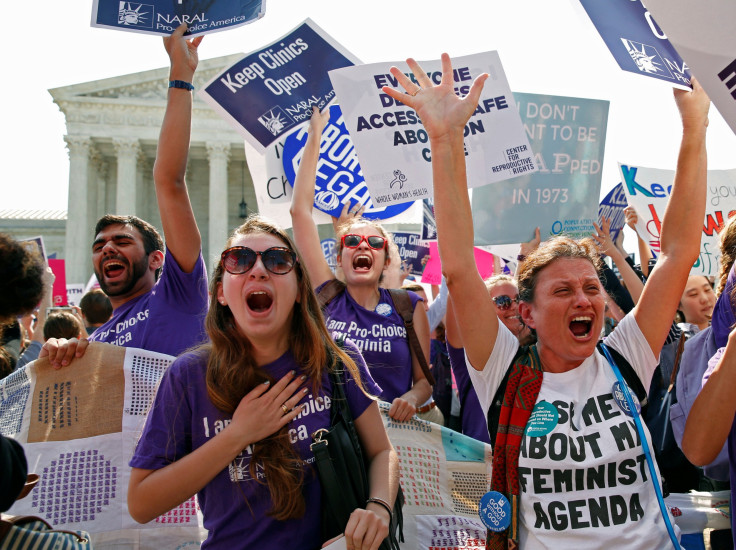Supreme Court Abortion Ruling 2016: Texas Law ‘Undue Burden,’ Struck Down By Court

UPDATE: 10:50 a.m. EDT — Democratic presidential candidate Hillary Clinton was quick to welcome the Supreme Court’s ruling in an abortion case Monday that stuck down a Texas law requiring doctors to have admitting privileges at hospitals and requiring all abortion clinics to meet the standards of ambulatory surgical facilities.
Clinton called the ruling a “victory for women in Texas and across America” but reminded voters that the next president will be crucial in protecting women’s health.
This fight isn't over: The next president has to protect women's health. Women won't be "punished" for exercising their basic rights. -H
— Hillary Clinton (@HillaryClinton) June 27, 2016
Advocacy groups on both sides weighed in on the court’s ruling, with pro-abortion rights groups applauding the 5-3 decision.
“Today is a great day for women, for our commitment to our Constitution and for the values of freedom and dignity that all Americans hold dear. The Supreme Court has powerfully reaffirmed a woman’s constitutional right to make her own decisions about her health, family and future, no matter her zip code,” Naral Pro-Choice America, an organization that advocates against abortion restrictions, said in a statement.
The Family Research Council, an anti-abortion group, said abortion facilities need to be regulated.
"The Supreme Court's decision to strike down HB2 undermines the health and safety of vulnerable women. This decision is a loss for women and gives the abortion industry a free pass,” the group wrote in a statement, using a pseudonym for the law.
Original story:
The Supreme Court struck down a Texas abortion law Monday that advocates argued made it more difficult for women to receive an abortion. The court ruled the law placed an undue burden on women.
The court's opinion is available online here. Justice Stephen Breyer wrote the court's opinion, in which it ruled 5-3. Justice Ruth Bader Ginsburg wrote a concurring opinion in the case, while Justices John Roberts, Clarence Thomas and Samuel Alito all dissented.

"The court’s patent refusal to apply well-established law in a neutral way is indefensible and will undermine public confidence in the court as a fair and neutral arbiter," Alito wrote in his dissent.
The case addressed two parts of a Texas law, known as HB2, that established new requirements on abortion clinics and medical professionals administrating procedures. The law, which was passed by Texas’s Republican-majority Legislature in 2013, required that any doctor performing abortions must have admitting privileges at a hospital in the area. The second portion of the law said all abortion clinics in Texas must meet standards as “ambulatory surgical centers.”
Supporters of the law insist it was meant to protect patient safety, while opponents argue it was meant to reduce the number of abortion clinics in Texas and restrict a woman's right to have an abortion. The case, Whole Woman’s Health v. Hellerstedt, was the first abortion argument heard since 2007 and exposed divisions in the Supreme Court between liberal and conservative justices.
Solicitor General Donald B. Verrilli Jr., who argued in support of clinics in March, said the law’s provisions were “more extreme than those of any abortion law that this court has considered.” Verrilli argued that the Texas law placed an undue burden on women and contained “unnecessary health regulations." In the 1992 decision Planned Parenthood v. Casey, the Supreme Court ruled states could not put an undue burden on the constitutional right to an abortion.
Scott A. Keller, Texas’s solicitor general, insisted that if the law is upheld by the court, “all the Texas metropolitan areas that have abortion clinics today will have open clinics.”
Liberal justices posed questions during March arguments about whether the law served any medical purpose for women’s health. Justice Ruth Bader Ginsburg asked Keller how many women would live 100 or more miles from a clinic under the Texas law. Keller answered 25 percent but said that did not include a clinic in neighboring New Mexico, which does not have the same requirements as the Texas law.
“That’s odd that you point to the New Mexico facility,” Ginsburg said to Keller. “So if your argument is right then New Mexico is not an available way out for Texas, because Texas says: To protect our women, we need these things. But send them off to New Mexico.”
The Supreme Court has issued a batch of opinions over the past several weeks on immigration, affirmative action and gun rights. A political battle over President Barack Obama’s Supreme Court nominee, Merrick Garland, has divided Republicans and Democrats in recent months after Justice Antonin Scalia died in February, leaving the court with eight members. Republicans argue whoever is elected in the November presidential contest should name the next justice.
© Copyright IBTimes 2024. All rights reserved.





















